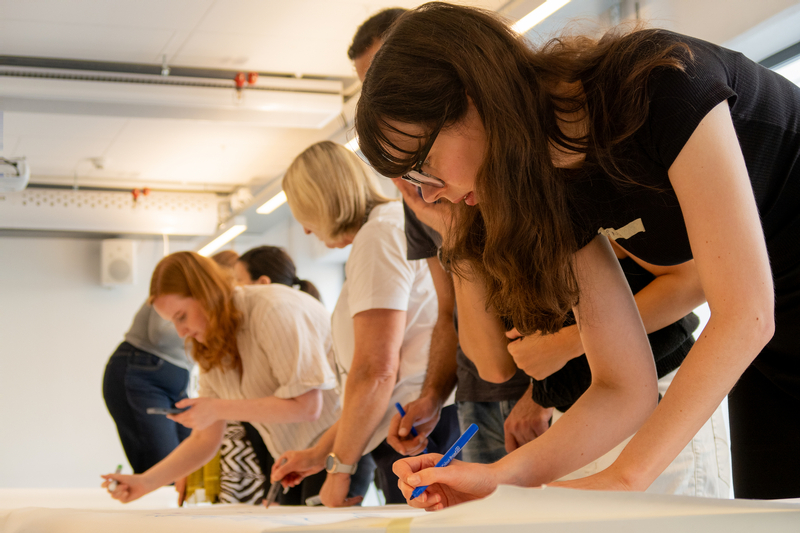If you’ve ever seen the job title “Business Development Manager” and quietly wondered, “Okay, but what do they do?”, you’re not alone.
The role sounds vague. It sits somewhere between strategy, partnerships, sales, and product; yet isn’t exactly any of those. And as industries evolve, technology advances, and new markets emerge, business development is becoming one of the most strategically valuable and creatively demanding roles out there.
So, what makes business development such a powerful function? And how can you start thinking like a business developer?
Let’s break it down!
Table of Contents
What is a Business Development Manager
A business developer is not just someone who "drives growth" (that description could fit dozens of roles). What truly sets business development apart is its focus on identifying and unlocking opportunities that others haven’t yet.
Think of business development managers as explorers:
- Scanning for new markets to enter
- Spotting unconventional distribution channels
- Creating strategic partnerships
- Connecting internal teams with external opportunities
They connect internal teams, customers, market trends, and potential opportunities. They work cross-functionally across departments like marketing, product, strategy, and ops but their lens is always focused what’s next.
Key Responsibilities of a Business Development Manager in 2025
The role of a business development manager is evolving fast. With new technologies, shifting customer habits, and global competition, companies need people who don’t just focus on selling, but who find new ways to grow the business through relationships, strategy, and smart decision-making.
Here are some of the core responsibilities for BDMs in 2025:
- Spotting new opportunities
Business developers look for gaps in the market, unmet customer needs, or new industries worth exploring. For example, a business developer working at a software company might realize that their tool - originally built for students -could also help freelancers, and figure out how to enter this new space. - Starting partnerships that make sense
Business developers build strong relationships with other companies. That could mean setting up a co-branded campaign, integrating tools with a new platform, or launching an affiliate partnership that benefits both sides. - Helping launch new products or features
When a company introduces something new, business developers help shape the perfect launch plan. They identify which audiences to target, find partners who can help spread the word, and adapt the launch plan for new regions or industries. - Gathering insights from people and the market
A good business developer spends time talking to customers, future clients, and other teams. They bring back useful insights — like pain points, early signals of change, or competitor activity — and help teams act on them before it’s too late. - Testing ideas before going big
Business developers often help pilot new ideas before fully launching them. This could be a 2-week test campaign, a beta version of a new offer, or a limited-time partnership — to see what works, without spending too much up front.
How the role differs in start-ups, scale-ups, corporations
Business development isn’t a one-size-fits-all job. What a business developer does can change a lot depending on the size and stage of the company — and the type of industry they’re in.
Here’s what it could look like in practice:
- In early-stage startups: BDMs wear many hats: outreach, partnerships, pitch decks, events.
→ Example: At a climate tech startup, a BDM might negotiate pilot programs with city governments, apply for grants, and collect feedback for the product team. - In scale-ups: The role becomes more strategic: market entry, bigger partnerships, growth plans.
→ Example: In a healthtech scale-up, a BDM might expand into new regions by negotiating with insurers and adapting messaging to local regulations. - In large corporations: Focus shifts to external growth: acquisitions, global partnerships, and new revenue streams.
→ Example: At a consumer goods giant, a BDM could scout emerging wellness brands for acquisition or joint ventures.
Across all contexts, the goal is the same: turning possibility into business outcomes.
Why Demand for Business Developers Is Rising
In a world of automation and uncertainty, companies are realizing they need connectors: people who can see what’s coming, initiate bold moves, and pull the right people together to make it happen.
That’s why business development roles are growing fast. According to LinkedIn’s Emerging Jobs Report, “business development representative” has been among the top 10 fastest-growing roles globally for several years running. And it’s not just the tech world: finance, education, sustainability, and even the public sector are leaning on Business Developers’ strategies to stay relevant and grow.
Business Development Manager Salary in 2025
Let’s talk numbers. Salaries for BDMs vary widely depending on region, industry, and seniority. Based on 2024/2025 data from Glassdoor, SalaryExpert, and LinkedIn Insights:
- Entry-level (1–2 years): €35,000–€50,000 per year
- Mid-level (3–5 years): €50,000–€75,000
- Senior or Lead BD roles: €80,000–€120,000+
- Additionally, companies often include performance bonuses, equity, or commission structures.
Earnings vary widely based on location, company size, and scope, but the long-term trajectory is strong, especially for those who move into strategic leadership.
Essential skills every Business Development Manager needs
A successful Business Development Manager (BDM) blends analytical sharpness with human-centered leadership.
The role is multidisciplinary, and the most in-demand skills reflect that balance.
Core skills (highlighted by employers and industry benchmarks):
- Communication & Negotiation: Strong written and verbal skills, persuasive presentations, and the ability to build trust with stakeholders.
- Strategic & Analytical Thinking: Spotting market trends, analyzing data, and designing long-term growth strategies.
- Sales & Commercial Awareness: Understanding revenue models, pipelines, and customer acquisition.
- Project & Stakeholder Management: Coordinating across departments and ensuring initiatives align with business goals.
- Leadership & Team Collaboration: Inspiring cross-functional teams, creating psychological safety, and facilitating feedback cultures.
Emerging skills (increasingly valued in 2025 and beyond):
- Digital Fluency: Ability to leverage digital tools, platforms, and AI-driven insights to shape growth.
- Innovation & Creativity: Designing experiments, testing new business models, and thinking beyond the obvious.
- Adaptability & Change Management: Thriving in uncertain, fast-changing environments and guiding others through transformation.
- Sustainability Mindset: Building business strategies aligned with environmental and social responsibility.
How to start thinking like a Business Development Manager
You don’t need to change your job title to start thinking like a business developer.
You just need to start looking at the world — and your work — with more curiosity, connection, and intent.
Business development isn’t about doing more. It’s about thinking differently — spotting opportunities, testing assumptions, and asking the kinds of questions that lead to smarter, more sustainable growth.
Here are a few ways to begin adopting that mindset in your day-to-day work — with real examples of how others have done it.
1. Ask Better Questions
Instead of “What are we selling?” try asking:
- Who could we serve next?
- What’s the problem no one’s solving yet?
- What assumptions are we making that might be outdated?
Real Example:
A design agency noticed that during brand workshops, clients kept asking for help with internal team dynamics. Instead of brushing it off, someone on the team asked, “Is this a sign that we could offer more than branding?” The result? A new service area in organizational design and culture — all from asking one better question.
2. Zoom Out Before You Zoom In
Business development thinkers always look at the system before acting. Before jumping into a task, they ask:
- How does this connect to the bigger picture?
- Where might there be leverage, not just output?
- Are we building the right thing — or just building something?
Real Example:
A product manager was trying to increase usage of a new feature. The data wasn’t great. Rather than iterate blindly, she stepped back and asked, “What role does this feature play in the full user journey?” That insight led to a shift in onboarding messaging — not in the product — and usage increased meaningfully.
3. Build Relationships (Not Just Networks)
Business development is deeply human. It’s about creating value through connection, not collecting contacts.
Ask yourself:
- Who do I want to collaborate with, and why?
- Where could a conversation lead to something unexpected?
- How can I give value even without expecting something back?
Real Example:
At a conference, a junior marketer struck up a random conversation with someone from a logistics firm. They stayed in touch. Six months later, that relationship led to a pilot test in a new market — an opportunity the marketing team hadn’t even scoped yet.
Education and training for Business Development Managers
Most Business Development Managers enter the field with a strong academic foundation.
Typically, employers look for:
- Bachelor’s degrees in Business Administration, Marketing, Management, Economics, or related fields.
- Master’s degrees (often preferred for senior roles) in International Business, Marketing, Digital Management, or Strategic Leadership.
- Specialized certifications in areas like Sales, Negotiation, Project Management (PMP/Prince2), or Digital Marketing.
While a degree helps, the career path also rewards practical experience: internships, early sales or account management roles, and hands-on exposure to international markets.
Many successful BDMs build credibility by combining formal education with continuous upskilling, particularly in digital transformation, data-driven decision-making, and leadership.
This is where modern, practice-based programs come in.
Instead of focusing only on theory, immersive training environments (like Hyper Island’s Business Developer and Digital Management programs) emphasize real-world projects, industry collaboration, and future-facing skills.
This helps bridge the gap between traditional qualifications and the fast-evolving demands of the role.
Further Your Career in Business Development.
If you’re inspired to take the next step in your career as a Business Development Manager, explore Hyper Island’s learning journeys:
-
🎯 Business Development Upskill Course – 26-week part-time program focused on digitalization, sustainability, and business innovation. Perfect if you want to strengthen your BD skillset alongside your current role.
-
🚀 Business Developer Program – A 65-week program with real-world projects (including collaborations with Volvo, Google, and Bolt). Designed to prepare you for roles such as Business Developer, Strategist, Product Owner, or Growth Specialist.
-
🌍 Master's Degree in Digital Management – A 15-month master’s degree, accredited by Teesside University (UK), combining online learning with industry projects for companies like Adidas, BBC, Greenpeace, and IBM.
Each program is built around the Hyper Island Way™: learn by doing, reflection, teamwork, and real-world industry projects.


WANT TO GET NOTIFIED ABOUT OUR EVENTS?
Join our mailing list for tips, events, and opportunities.

